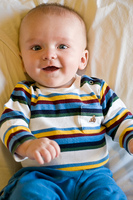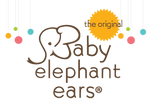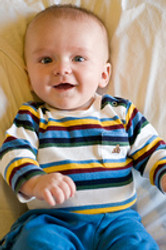The Deal with Baby Hiccups and How to Treat Them
16th Feb 2015
 Hiccups are harmless, but pretty darn annoying. They can
happen to anyone, even babies in the womb! You see, there’s a band of muscle
that expands and contracts when you breathe. When this muscle receives some odd
stimulation, it can spasm.
Hiccups are harmless, but pretty darn annoying. They can
happen to anyone, even babies in the womb! You see, there’s a band of muscle
that expands and contracts when you breathe. When this muscle receives some odd
stimulation, it can spasm.
The strength of the spam is proportional to the size of the muscle, so a baby hiccup isn’t as powerful as some you or I might have. Nor are hiccups part of some greater problem. Your baby might find them unsettling, or might not mind them at all.
As our digestive systems mature, we become less prone to hiccups, so even if your baby gets them every day, don’t worry that it’s a lifelong condition. Until your child is older, here are some ways you can treat your baby’s hiccups.
Keep a hiccup diary
When your baby has the hiccups, make a note of the time and what you were doing. Jot a few notes so you can look back after a few days and possibly notice a pattern. For example, you might notice that your child gets the hiccups whenever you feed immediately after a crying fit. In this case, you would know to calm your baby before feeding.
Reduce air swallowing
It’s common for an infant to gulp too much air during a feeding, which expands the stomach and causes hiccups and gas. Watch and listen to your baby as he feeds. If his stomach is distended or you can hear a hollow smacking sound, he’s accumulating air.
Breastfeeding moms should review their latch to make sure there is closed suction. Bottle-feeding moms should make sure they’re using a small enough nipple.
Give a pacifier
There’s no scientific evidence that this works, but enough moms swear by it that it’s worth mentioning. Sucking on a pacifier could stimulate the muscles in the throat and upper respiratory area enough to force the diaphragm back to normal movements. In the very least, it gives your baby something soothing to focus on so they don’t become stressed.
Feed twice as often, but half as much
Hiccups are generally associated with feeding. If the stomach changes shape too quickly (to full or to empty), the diaphragm could be stimulated and trigger spasms. You can prevent this by feeding less food more often. This will keep your baby’s stomach at the same general size (with minor fluctuations).
If your baby insists on being fed right now, slow down your feedings by pausing halfway through for a burp and a break. Speak to your baby for a few minutes before resuming.
Burp after feeding and keep baby upright
I know after a nighttime feeding your baby is sleepy and you’re anxious to get back to sleep too, but a good burp is essential. The burp will relieve pressure off the diaphragm so it doesn’t spasm and cause hiccups.
Worst case: it could be acid reflux
In a small number of babies, gastro esophageal reflux could cause hiccups. If your baby regurgitates some of the stomach contents into the esophagus, the bile could cause pain and hiccups. If you notice a trend between spitting up and hiccups, consult your doctor.
 Guest Blog by Cindy Perry, Inventor of the pello, Luxe Floor Pillows
Guest Blog by Cindy Perry, Inventor of the pello, Luxe Floor Pillows
Cindy, a Texas girl, put herself through college working at a children’s library and sewing at night. When she met her husband and had her two boys, she decided to stay home to care for them while designing window treatments and bedding.
When Cindy’s first son was learning to sit up, he would always fall through the pillows she set around him, hit his head, and cry. Besides, setting her child down on the hardwood floors on just a blanket always seemed so cold. Using her years of sewing and design skills, Cindy took inspiration from a woman in her breastfeeding class and got to work. With some scrap fabric and a few tweaks, pello was born! pello is a luxe floor pillow that helps children feel safe, warm and protected.
For more information, visit mypello.com.
For more information, visit www.babyelephantears.com.
Interested in writing a guest blog for Baby Elephant Ears? Send your topic idea to pr@babyelephantears.com.
All data and information provided on this site is for informational purposes only. Baby Elephant Ears makes no representations as to accuracy, completeness, current-ness, suitability, or validity of any information on this site and will not be liable for any errors, omissions, or delays in this information, or any losses, injuries, or damages arising from its display or use. All information is provided on an as-is basis.
Photo Credit: Vivian Chen [陳培雯] via Compfightcc

